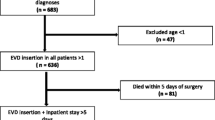Abstract
Background
Iatrogenic ventriculitis is a common complication of the external ventricular drainage. While the procedure and indications for external ventricular drains (EVD) are highly standardized, the treatment of ventriculitis is not clearly defined.
Objective
To depict the treatment of iatrogenic ventriculitis currently performed in German hospitals.
Methods
A standardized questionnaire consisting of 18 multiple choice questions, each with the ability to provide additional individual answers, covering the diagnosis and treatment of iatrogenic ventriculitis as well as general handling of EVDs, was sent to 121 neurosurgical hospitals registered in the German Society for Neurosurgery (DGNC).
Results
Thirty-three out of 121 hospitals returned the questionnaire. While diagnostics are performed similarly in most hospitals, the treatment varies remarkably. Ten of the 33 (30%) units never applied antibiotics intrathecally and 12 (36%) only in selected (1–20%) cases, while 7 (21%) do this routinely, and the remaining 4 centers vary their treatment. While the targeted systemic therapy after pathogen identification and resistance testing is similar, the choice of empiric antibiotics varies as does the type of drug used for intrathecal therapy. Among the applied systemic antibiotics, vancomycin [n = 23 (70%)] and meropenem [n = 22 (67%)] were the most common, but many others, including ceftriaxone, metronidazol, linezolid, piperacillin/tazobactam, fosfomycin and ceftazidim, are used. There is no standard practice regarding EVD handling. Twelve (36%) hospitals do not replace the EVD after a new diagnosis of ventriculitis, 13 (39%) do so once after the diagnosis, and 8 (24%) regularly switch EVDs after a defined time span (7–20 days), even without signs of infection.
Conclusion
Treatment concepts for iatrogenic ventriculitis are very heterogeneous. Thus, there is an urgent need for generating outcome data and defining a standard treatment algorithm with the recently published practice guideline being an important first step.
Similar content being viewed by others
References
Chen K, Wu Y, Wang Q, Wang J, Li X, Zhao Z, Zhou J (2015) The methodology and pharmacokinetics study of intraventricular administration of vancomycin in patients with intracranial infections after craniotomy. J Crit Care 30(1):218.e1-5
Dasic D, Hanna SJ, Bojanic S, Kerr RSC (2006) External ventricular drain infection: the effect of a strict protocol on infection rates and a review of the literature. Br J Neurosurg 20(5):296–300
Dey M, Stadnik A, Riad F, et al (2015) Bleeding and infection with external ventricular drainage: A systematic review in comparison with adjudicated adverse events in the ongoing Clot Lysis Evaluating Accelerated Resolution of Intraventricular Hemorrhage Phase III (CLEAR-III IHV) trial. Neurosurgery 76(3):291–300
Flint AC, Rao VA, Renda NC, Faigeles BS, Lasman TE, Sheridan W (2013) A simple protocol to prevent external ventricular drain infections. Neurosurgery 72(6):993–999
Jorgenson L, Reiter PD, Freeman JE, Winston KR, Fish D, McBride LA, Handler MH (2007) Vancomycin disposition and penetration into ventricular fluid of the central nervous system following intravenous therapy in patients with cerebrospinal devices. Pediatr Neurosurg 43(6):449–455
Liu C, Bayer A, Cosgrove SE et al (2011) Clinical practice guidelines by the infectious diseases society of america for the treatment of methicillin-resistant Staphylococcus aureus infections in adults and children. Clin Infect Dis 52(3):e18–e55
Lyke KE, Obasanjo OO, Williams MA, O’Brien M, Chotani R, Perl TM (2001) Ventriculitis complicating use of intraventricular catheters in adult neurosurgical patients. Clin Infect Dis 33(12):2028–2033
Pfausler B, Spiss H, Beer R, Kampl A, Engelhardt K, Schober M, Schmutzhard E (2003) Treatment of staphylococcal ventriculitis associated with external cerebrospinal fluid drains: a prospective randomized trial of intravenous compared with intraventricular vancomycin therapy. J Neurosurg 98(5):1040–1044
Sonabend AM, Korenfeld Y, Crisman C, Badjatia N, Mayer SA, Connolly ES (2011) Prevention of ventriculostomy-related infections with prophylactic antibiotics and antibiotic-coated external ventricular drains: a systematic review. Neurosurgery 68(4):996–1005
Tunkel AR, Hartman BJ, Kaplan SL, Kaufman BA, Roos KL, Scheld WM, Whitley RJ (2004) Practice guidelines for the management of bacterial meningitis. Clin Infect Dis 39(9):1267–1284
Tunkel AR, Hasbun R, Bhimraj A, Byers K, Kaplan SL, Michael Scheld W, van de Beek D, Bleck TP, Garton HJL, Zunt JR (2017) 2017 Infectious Diseases Society of America’s clinical practice guidelines for healthcare-associated ventriculitis and meningitis*. Clin Infect Dis. https://doi.org/10.1093/cid/ciw861
Wang Q, Shi Z, Wang J, Shi G, Wang S, Zhou J (2008) Postoperatively administered vancomycin reaches therapeutic concentration in the cerebral spinal fluid of neurosurgical patients. Surg Neurol 69(2):126–129
Funding
No funding was received for this research.
Author information
Authors and Affiliations
Corresponding author
Ethics declarations
Conflict of interest
All authors certify that they have no affiliations with or involvement in any organization or entity with any financial interest (such as honoraria; educational grants; participation in speakers’ bureaus; membership, employment, consultancies, stock ownership, or other equity interest; and expert testimony or patent-licensing arrangements), or non-financial interest (such as personal or professional relationships, affiliations, knowledge or beliefs) in the subject matter or materials discussed in this manuscript.
Ethical approval
For this type of study formal consent or ethical approval is not required. This article does not contain any studies with human participants performed by any of the authors.
Electronic supplementary material
ESM 1
(PDF 274 kb)
Rights and permissions
About this article
Cite this article
von Spreckelsen, N., Jung, N., Telentschak, S. et al. Current treatment concepts for iatrogenic ventriculitis: a nationwide survey in Germany. Acta Neurochir 160, 505–508 (2018). https://doi.org/10.1007/s00701-017-3393-8
Received:
Accepted:
Published:
Issue Date:
DOI: https://doi.org/10.1007/s00701-017-3393-8



